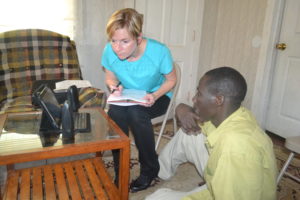
When coordinating services for individuals and families, good communication is the key. But what if an individual or family speaks a language other than English? Boone County Family Resources can provide a language interpreter to communicate about service coordination in a family’s native language. This can be done by hiring an interpreter to attend a meeting in-person or by using Stratus, a web-based tool that provides on-demand interpreting services via video and/or teleconferencing.
For the last two years, BCFR focused outreach efforts on increasing services to immigrants and refugees living in Boone County. A language barrier can make the progress of coordinating services cumbersome at best. With Stratus video interpreting service, however, improved communication is a finger tap away. Support coordinators can check out tablets with the Stratus app installed to bring to meetings with persons served. They simply log into the application and tap on the appropriate language and the interpreting services begin. Currently, there are 200 different language interpreters available via teleconference (voice only) and 18 via videoconference.
Support Coordinator, Sherry Nemeth, is among the first to use Stratus regularly to assist in planning services for a family on her case load. “I used the Stratus tool for the first time in April of this year. It already has made a huge improvement in communicating with this particular family,” says Sherry. “By hurdling the language barrier, we can get so much more accomplished in our meetings. Before Stratus, a simple meeting with the family would require coordinating the schedule of the interpreter with the schedule of the family—which is not always an easy task. With this technology though, we have come a long way in a short time.”
Jennifer Gremmel, the agency’s self-directed services coordinator, has also used Stratus to speak with a couple of different families who participate in the Home-based Support Services program. She echoes Sherry’s comments on the helpfulness of the tool. “Stratus speeds up the process of connecting with families who don’t speak English fluently. In the past, I would have to schedule an in-person meeting with non-English speaking families to come to our offices to explain a form or to have a quick discussion. Now, I am able to call them through Stratus with an interpreter on the line and address their concerns and questions in a more efficient manner. The tool is easy to use and is definitely helping to overcome some communication barriers.”
The technology is not without its challenges. The tablet uses a Wi-Fi hotspot to connect with the Internet and in some cases, signals are weak or spotty, but these minor setbacks more than make up for the ability to share important information with persons served in their native language. “Hearing the interpreter explaining aspects of the service coordination and seeing the confusion disappear from the parent’s faces is worth any technological glitches,” says Sherry. “This family is very satisfied with using Stratus to communicate about services to help their child.”
In addition to Stratus and hiring in-person interpreters, BCFR also has staff members fluent in both Spanish and ASL. The reception desk at the BCFR main office also has a tablet with the Stratus app loaded in order to assist persons who walk in with questions.